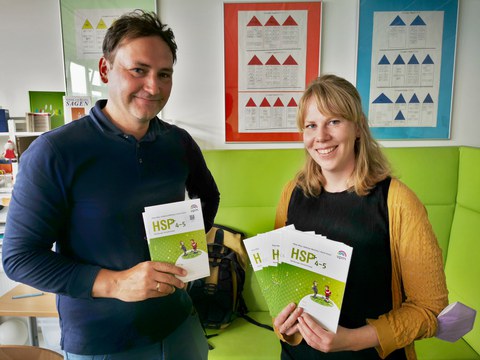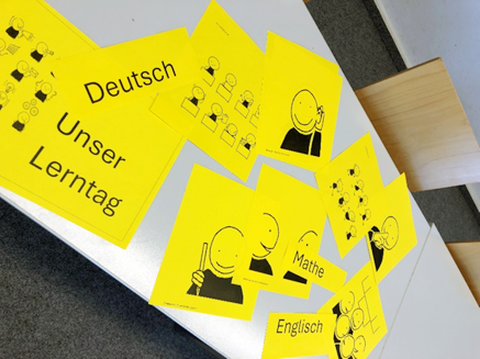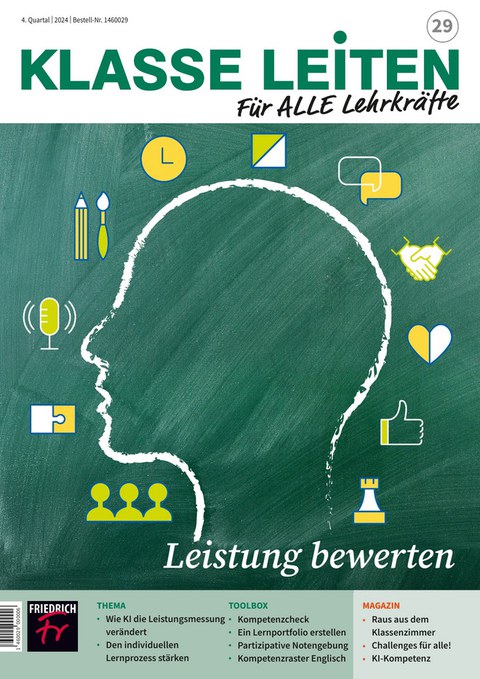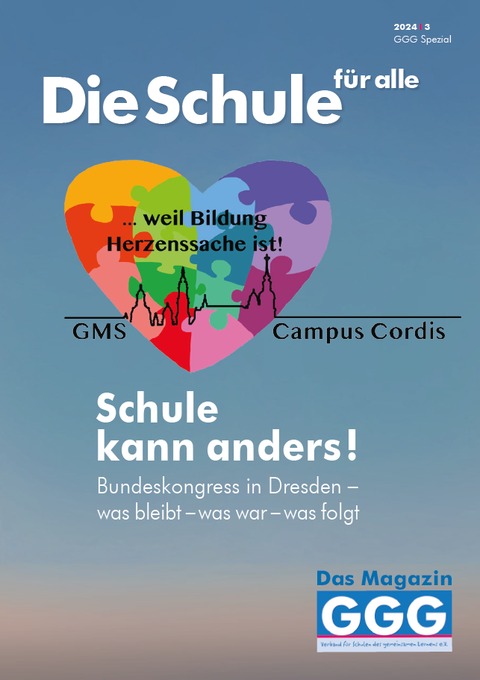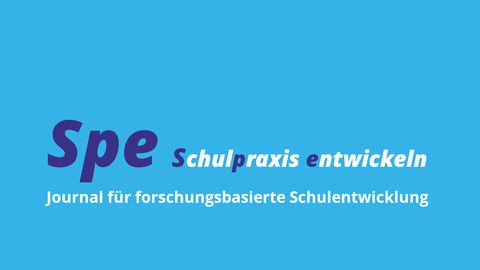Nov 29, 2024
Learning paths, theory-practice interlinking, competence development in comparison – Publications of the ForUS research center in fall 2024
In autumn 2024, we would like to draw your attention to the following publications from the ForUS - University School Research Unit at TU Dresden and other specialist colleagues. Anke Langner and Katja Kuritz have published a detailed description of the pilot project at schools in eastern Saxony. Anke Langer and head teacher Maxi Heß present the digital learning and performance documentation with learning paths at Dresden University School in the current issue of ‘Klasse leiten’. Christoph Haßler, Anke Langner, Marlis Pesch and Matthias Ritter present the first evaluation of the survey on the skills of USD students in comparison (also with neighbouring schools). A very lively observation report by Susanne Gondermann was published in the GGG magazine ‘Schule für alle’. Kris-Stephen Besa, Annalisa Biehl and Jan-Hendrik Hinzke have accepted the first guest editorship for the online journal Spe - Schulpraxis entwickeln with the thematic issue on ESD - Education for Sustainable Development.
On the Dresden University School project website you will find further scientific and non-scientific publications as well as a media review.
Interlocking theory and practice in the teacher training program - an alternative internship format at selected secondary schools in eastern Saxony
The discussion about the poor integration of theory and practice in teacher training programs is not new, and the cyclical emergence of a shortage of teachers is also well known in the discourse of educational science. This article will present how both challenges can complement each other in a crisis situation and open up new creative spaces. To this end, the piloting of the deployment of student teachers for one day a week in the rural region will be traced by determining both the implementation and the findings from the pilot as well as the design of a further implementation phase.
Langner, A., & Kuritz, K. (2024). A structural framework for student practice experiences to support schools in Eastern Saxony in the face of teacher shortages. PFLB - PraxisForschungLehrer*innenBildung, 6(1), 205-218. https://doi.org/10.11576/pflb-7567
On the project website you will find further information on the semester-accompanying school internship at selected secondary schools in East Saxony.
Learning paths - an instrument for digital learning and performance documentation at Dresden University School
When performance is achieved, what is assessed? The effort put in along the way and the gain in knowledge and insight compared to what you knew or were able to do at the beginning? Often only the result counts. Performance assessments in the form of grades always have to accept the criticism that they only test selectively, inevitably include too few aspects and are subject to subjective criteria. This is why schools are increasingly being asked for more individualized, more open performance assessments.
It is easier to determine the actual performance behind a result if the learning process is monitored and documented. To make this process more transparent for everyone involved, Dresden University School has developed learning paths.
Anke Langner and Maxi Heß: "Organizing, accompanying and evaluating students' learning paths. Digital learning and performance documentation at Dresden University School" In: Evaluating Performance, Managing Class | Issue No. 29/2024
Competency development at Dresden University School in comparison - ForUS research center presents test results at Dresden schools
Since the 2021/22 school year, pupils at Dresden University School have been taking part in standardized tests to assess their learning status (Hamburger Schreibprobe HSP and Deutscher Mathematiktest DEMAT). This article presents and discusses the learning status of pupils at Dresden University School in years 2 to 8 in the 2022/23 school year. On the one hand, they are set in relation to the results of the students in the previous year (school year 2021/22) in the same grade. Secondly, the results of Years 3 and 5 at the university school are compared with the same year groups at other schools (different types of school).
The two test procedures only take into account partial aspects of the learning status of pupils (at the university school). A comprehensive understanding of education (Langner & Pesch, forthcoming; OECD, 2019) takes into account not only traditional cultural techniques such as writing, arithmetic and reading, but also other skills such as the ability to self-regulate learning and learning in cooperative learning settings. The results presented here therefore only represent one aspect of the pupils' learning status.
Haßler, Christoph; Langner, Anke; Pesch, Marlis; Ritter, Matthias; Research Center University School (2024). Mathematical and spelling skills of students at the University School Dresden. Analysis in grades 2 to 8 in the school year 2022/23. Dresden: TUD Dresden University of Technology 2024, 53 p. - URN: urn:nbn:de:0111-pedocs-319379 - DOI: 10.25656/01:31937
Dresden University Community School - a school that makes a name for itself. Observation report from the Federal Congress for Longer Joint Learning
In May 2024, the Federal Congress for Longer Joint Learning took place in Dresden. As part of the event, which lasted several days, the first two public community schools - Campus Cordis in the north of Dresden and University School Dresden (USD) in the south of the city - invited visitors to observe them. The report "Universitätsgemeinschaftsschule Dresden - eine Schule, die von sich reden macht" about the learning day at USD by Susanne Gondermann has now been published in the series DIE SCHULE für alle in the special issue GGG Spezial - Schule kann anders! (online edition and download as PDF).
A detailed version of the observation report is available on the website of the joint school experiment of TU Dresden and the City of Dresden: Susanne Gondermann: "Universitätsgemeinschaftsschule Dresden - eine Schule, die von sich reden macht". In the publication overview on the project website, it can be found under Further publications.
Thematic issue ESD - Education for Sustainable Development in ‘Spe - Developing school practice’
Prof Anke Langner and Dr Matthias Ritter as editors of ‘Spe - Schulpraxis entwicklen. Journal for research-based school development’ invite you to be guest editors. For the special issue ‘Education for Sustainable Development in School Development. Themes, Concepts & Forms of Implementation’, Kris-Stephen Besa (University of Konstanz), Annalisa Biehl (University of Münster) and Jan-Hendrik Hinzke (Justus Liebig University Giessen) have accepted this invitation and curated seven exciting articles on education for sustainable development.
Spe - Developing school practice. Journal for research-based school development has been published since 2022. The open access publication provides an insight into applied educational research in the University School Dresden school trial and also serves to promote the academic exchange of innovative (reform) schools.
The journal is supported by the Association of University and Experimental Schools VUVS, a network of university locations that strive for closer cooperation between research institutions, teacher training and school practice in very different formats.
Bildung für Nachhaltige Entwicklung in der Schulentwicklung. Themen, Konzepte & Umsetzungsformen (2024, Hg. Kris-Stephen Besa, Annalisa Biehl und Jan-Hendrik Hinzke), Schulpraxis Entwickeln – Journal für Forschungsbasierte Schulentwicklung, Bd. 3 Nr. 1
About the University School Dresden
Dresden University School is a joint project of the state capital Dresden and the TUD Dresden University of Technology. It is a public and free community school run by the city, where innovative forms of teaching and learning are tested under academic supervision. In addition, it is a training school for future teachers and, in the future, a further education school for teachers. The school trial is being scientifically supported by the ForUS - University School Research Unit at TU Dresden.
Information on the research project at TU Dresden: https: //tu-dresden.de/gsw/unischule
Information on the Dresden University School: http://universitaetsschule.org
You can find insights into the research project and everyday school life on various social media channels under @unischuleTUD: Facebook, X, Instagram, YouTube and LinkedIn. News from the University School Dresden project can be found regularly in the GSW newsletter.

